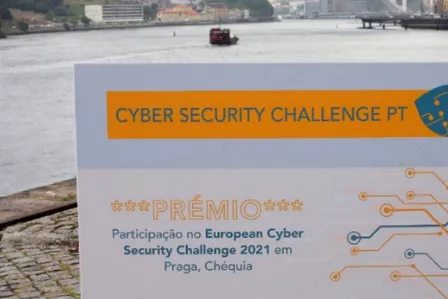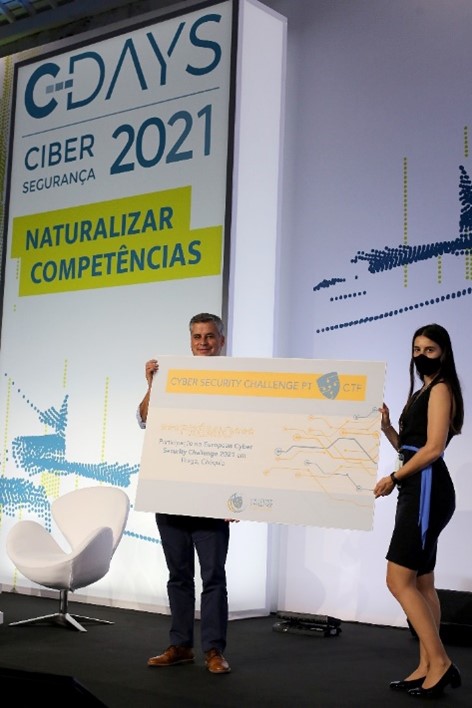According to the most common definition, a Capture-The-Flag (CTF) is a “competitive computer security event where participants compete in security-themed challenges for the purpose of obtaining the highest score”. The name originates from the outdoor game in which participants seek to find and retrieve a physical flag. This type of competition is becoming increasingly popular, with the number growing consistently every year.

CTF events are held worldwide, with participants from a range of age groups and skill levels. The educational benefits of security competitions are being validated by the success of events aimed at school and university-age groups. More events are targeted at these groups than at professionals, which suggests the value of CTFs as introductory and skill-building opportunities.
In Portugal, the "Cyber Security Challenge PT” initiative results from close cooperation between the National Cyber Security Centre, academia, and the cyber security community. The initiative, supported by the Portuguese Safer Internet Centre (SIC), gives national students the opportunity to upscale their skills in cyber security by providing a healthy space of learning, competition, student-to-student coaching, and mentorship. Moreover, identifying young national talent can help students pursue future professional careers.
The Cyber Security Challenge PT initiative is also part of the education axis of the Portugal INCoDe.2030 programme; an integrated public policy that aims to train and educate the youngest layers of the population through stimulus and reinforcement in the fields of digital literacy and digital skills, in all cycles of education and lifelong learning.
Every year, the Cyber Security Challenge PT promotes a CTF competition where participants test their skills in various areas of computer security. Solving complex computer security challenges allows for the development of collaboration and networking processes and leads to individual growth. The competition selects a team of 10 students to represent Portugal in the European Cyber Security Challenge and other international competitions.
This year, the national CFT competition of the Cyber Security Challenge PT took place in June during the C-Days conference. The 10 winning students were announced in the closing ceremony. The team will now represent Portugal in the European Cyber Security Challenge 2021 taking place from 28 September to 1 October in Prague, Czech Republic.

The European Cyber Security Challenge is a CFT competition organised by the European Union Agency for Cybersecurity (ENISA) that brings together young talent from all over Europe and takes place in an environment of fair play. Over four days, the selected competing national teams are challenged to solve cybersecurity-related tasks such as web security, mobile device security, cryptography puzzles, reverse engineering, and forensic analysis in a jeopardy format. They are predominantly technical challenges but with the possibility of including social engineering challenges, lockpicking, and interacting with other teams to gather all the parts of a flag. Physical security challenges such as lockpicking are sometimes incorporated into the main, scored competition, while others are conducted as an unscored peripheral activity (such as a guided exercise, from the author's experience, in which participants performed a physical wiretap of a network cable).
The CTF culture also places significant importance on the creation, study and dissemination of post-event writeups. Each write-up explains the details of a challenge and its solution from the perspective of the participant or team. These are widely shared, and repositories exist that collect them together. This is reinforced by the Cyber Security Challenge PT, which encourages students to make and share high-quality writeups of the competitions and exercises in which they participate so that others can understand the technicalities behind the challenges. This acts as both a training moment and provides a knowledge base for others.
In this manner, the Cyber Security Challenge PT, jointly with the Portuguese Safer Internet Centre, aims to provide a place of sharing, education, training, opportunity, and community in the national cyber security spectre.
Find out more about the work of the Portuguese Safer Internet Centre, including its awareness raising, helpline, hotline, and youth participation services – or find similar information for Safer Internet Centres throughout Europe.
October is European Cyber Security Month. Find out more at www.cybersecuritymonth.eu.
According to the most common definition, a Capture-The-Flag (CTF) is a “competitive computer security event where participants compete in security-themed challenges for the purpose of obtaining the highest score”. The name originates from the outdoor game in which participants seek to find and retrieve a physical flag. This type of competition is becoming increasingly popular, with the number growing consistently every year.

CTF events are held worldwide, with participants from a range of age groups and skill levels. The educational benefits of security competitions are being validated by the success of events aimed at school and university-age groups. More events are targeted at these groups than at professionals, which suggests the value of CTFs as introductory and skill-building opportunities.
In Portugal, the "Cyber Security Challenge PT” initiative results from close cooperation between the National Cyber Security Centre, academia, and the cyber security community. The initiative, supported by the Portuguese Safer Internet Centre (SIC), gives national students the opportunity to upscale their skills in cyber security by providing a healthy space of learning, competition, student-to-student coaching, and mentorship. Moreover, identifying young national talent can help students pursue future professional careers.
The Cyber Security Challenge PT initiative is also part of the education axis of the Portugal INCoDe.2030 programme; an integrated public policy that aims to train and educate the youngest layers of the population through stimulus and reinforcement in the fields of digital literacy and digital skills, in all cycles of education and lifelong learning.
Every year, the Cyber Security Challenge PT promotes a CTF competition where participants test their skills in various areas of computer security. Solving complex computer security challenges allows for the development of collaboration and networking processes and leads to individual growth. The competition selects a team of 10 students to represent Portugal in the European Cyber Security Challenge and other international competitions.
This year, the national CFT competition of the Cyber Security Challenge PT took place in June during the C-Days conference. The 10 winning students were announced in the closing ceremony. The team will now represent Portugal in the European Cyber Security Challenge 2021 taking place from 28 September to 1 October in Prague, Czech Republic.

The European Cyber Security Challenge is a CFT competition organised by the European Union Agency for Cybersecurity (ENISA) that brings together young talent from all over Europe and takes place in an environment of fair play. Over four days, the selected competing national teams are challenged to solve cybersecurity-related tasks such as web security, mobile device security, cryptography puzzles, reverse engineering, and forensic analysis in a jeopardy format. They are predominantly technical challenges but with the possibility of including social engineering challenges, lockpicking, and interacting with other teams to gather all the parts of a flag. Physical security challenges such as lockpicking are sometimes incorporated into the main, scored competition, while others are conducted as an unscored peripheral activity (such as a guided exercise, from the author's experience, in which participants performed a physical wiretap of a network cable).
The CTF culture also places significant importance on the creation, study and dissemination of post-event writeups. Each write-up explains the details of a challenge and its solution from the perspective of the participant or team. These are widely shared, and repositories exist that collect them together. This is reinforced by the Cyber Security Challenge PT, which encourages students to make and share high-quality writeups of the competitions and exercises in which they participate so that others can understand the technicalities behind the challenges. This acts as both a training moment and provides a knowledge base for others.
In this manner, the Cyber Security Challenge PT, jointly with the Portuguese Safer Internet Centre, aims to provide a place of sharing, education, training, opportunity, and community in the national cyber security spectre.
Find out more about the work of the Portuguese Safer Internet Centre, including its awareness raising, helpline, hotline, and youth participation services – or find similar information for Safer Internet Centres throughout Europe.
October is European Cyber Security Month. Find out more at www.cybersecuritymonth.eu.
- education
Related content
- < Previous article
- Next article >











